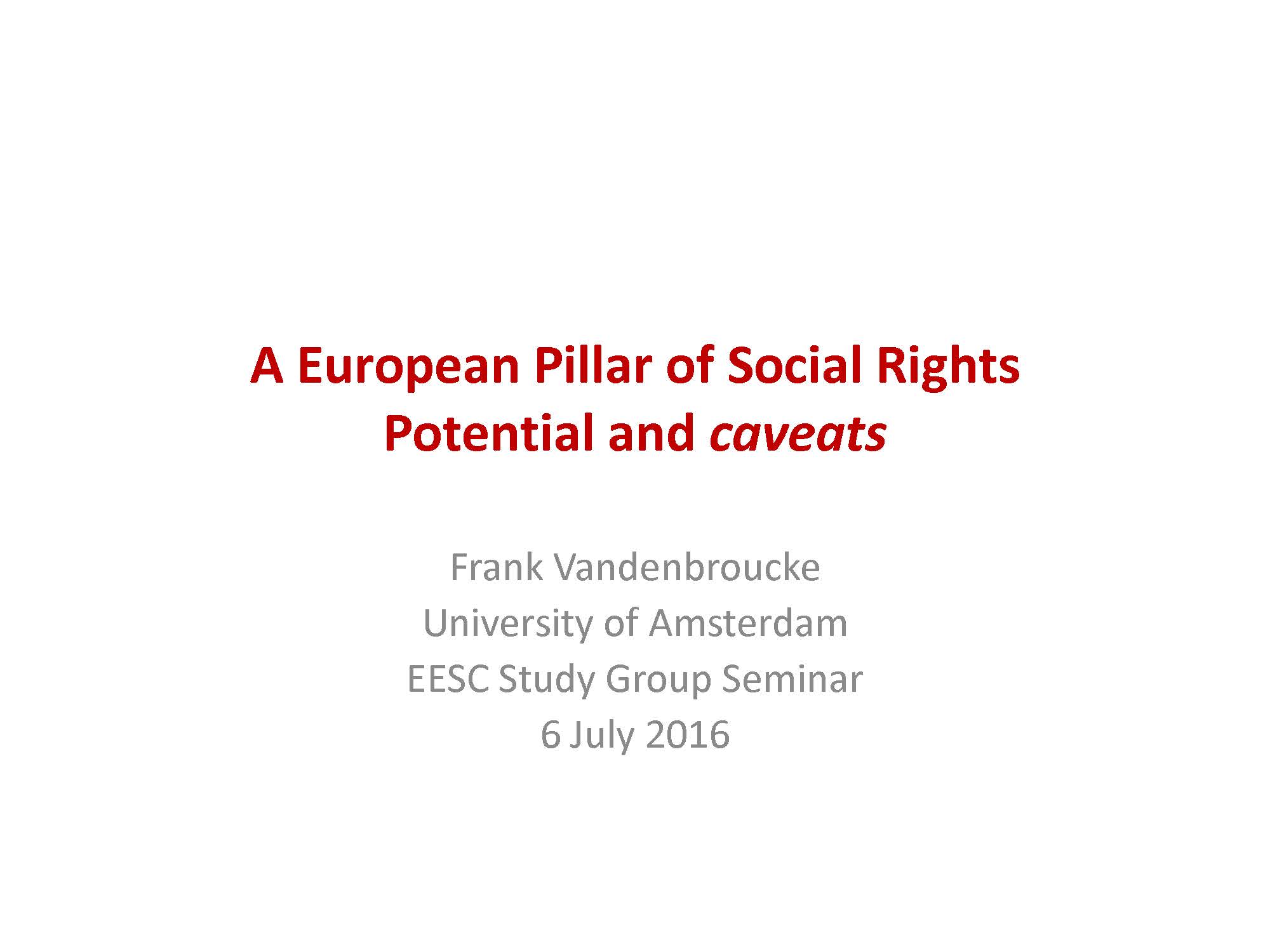 Download presentation
Download presentation
Pillar_Social_Rights_EESC_Seminar_Vandenbroucke_5-7-2016_final
A European Pillar of Social Rights
Potential and caveats
Frank Vandenbroucke
University of Amsterdam
EESC Study Group Seminar
6 July 2016
A basic consensus on the social objectives of EMU/EU is a
necessity…
• … for the EU to be a union of well-functioning welfare states
(social & economic stabilisation; upward convergence)
• Arguments related to EMU
• Arguments related to EU28 (now 27)
• A European Pillar of Social Rights: potential & caveats
Social and economic stabilisation: the contribution of transfers
(not pensions) in the reduction of poverty
0
5
10
15
20
25
30
2004-06 2012
Inadequate welfare states
Austerity & problem of stabilisation Erosion of mature welfare states ?
Source: Eurostat, own calculation of ‘poverty reduction by transfers (excl. pensions)’, total population, SILC
2005-2007 en SILC 2013
A basic consensus on the social objectives of EMU is a necessity
• The problem of stabilisation => any ‘Eurozone re-insurance’ of national
stabilisation policies presupposes (a) minimum requirements w.r.t. the
adequacy of national unemployment insurance and the concomitant
labour market regulation; and (b) general trust in the quality of each
other’s social fabric.
• More generally, EMU forces upon the member states :
– a shared conception of labour market flexibility (and , hence, security)
– symmetric guidelines on wage cost competitiveness (e.g. ‘golden rule’ linking
wages to productivity) & institutions that can deliver (importance of coordinated
collective bargaining)
– long term: sustainability of pensions
• The need for conceptual clarity: a European Social Union ≠ a European
Welfare State
Arguments related to EU28 (now 27)
• An inevitability of European Monetary Union;
• Upward convergence across the EMU/EU28 requires a combination
of social investment, sufficiently egalitarian background conditions
and social protection
• Freedom of movement and national social cohesion in EU: a
‘balancing act’ is possible, based on sound and consistent principles
– Non-discrimination of mobile workers / delineated role for posting
– ‘Social dumping’ related to mobility: also depends on domestic labour
market regulation
– Economic freedoms right to strike (Viking, Laval)European
A European Pillar of Social Rights: arguments
• A basic consensus about the general features of the ‘social
order’ that is associated with the Monetary Union is a
necessity; the EPSR can contribute to such a consensus.
• Upward convergence across the EMU/EU28 requires a
combination of social investment, sufficiently egalitarian
background conditions and social protection, as embodied in
the EPSR.
• Cross-border mobility must be embedded in employment
relations of sufficient quality: a role for EPSR
A European Pillar of Social Rights: caveats
• The expression ‘rights’ creates expectations
• If the perception is that the EPSR is a ‘replay’ of earlier initiatives based on soft coordination,
the initiative will frustrate expectations and backlash
• There is a need both for social benchmarking and for a legislative agenda; two relationships
are to be clarified:
– The relation between the EPSR and the new social benchmarking initiative announced by the
Commission in its Work Programme 2016 and its Communication of 21.10.2015 on the follow-up of
the Five Presidents’ Report
– The relation between the EPSR and the legal acquis in domains in which the EU has legislative
competences
• A link is needed with the ‘hard’ agenda on the completion of EMU, notably the case for a
Eurozone stabilisation capacity (cf. supra, ‘re-insurance’ and minimum requirements)
• The EPSR should be discussed and consolidated at the highest political level (cf. the political
salience of the Fiscal Compact)
Resources
1) Vandenbroucke and Rinaldi, Social inequalities in Europe – The challenge of
convergence and cohesion. In: Vision Europe Summit Consortium (eds.): Redesigning
European welfare states – Ways forward, Gütersloh (http://www.vision-europesummit.eu/)
2) Vandenbroucke, The Case for a European Social Union. From Muddling through to a
Sense of Common Purpose, in Marin, B. (Ed.), The Future of Welfare in a Global Europe,
Ashgate: Aldershot UK, 2015, pp. 489-520.
3) Vandenbroucke, A European Social Union: Unduly Idealistic or Inevitable?, European
Debates, 7, European Investment Bank Institute, September 2015
(http://institute.eib.org/wp-content/uploads/2015/09/A-European-Social-UnionUnduly-Idealistic-or-Inevitable.pdf)
4) Vandenbroucke, Sociaal beleid in een muntunie: puzzels, paradoxen en perspectieven,
Inaugural Lecture at the University of Amsterdam, 1 June 2016
www.frankvandenbroucke.uva.nl
